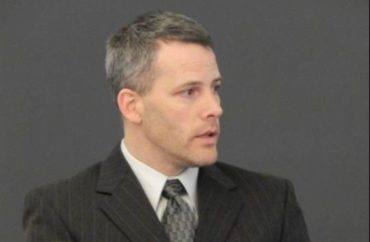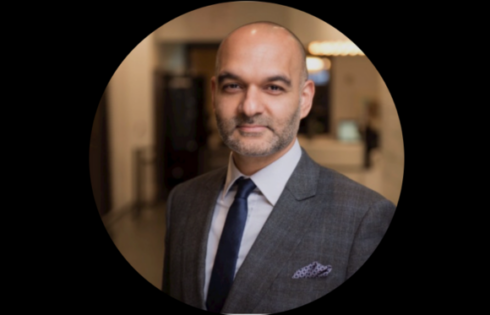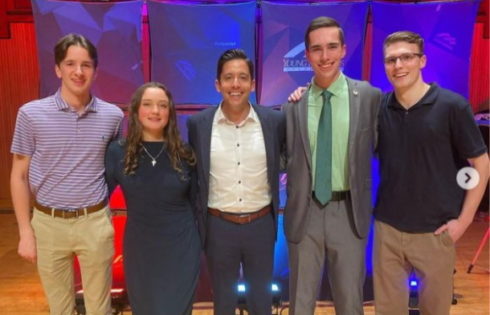
Instagram account falsely claimed he tried to justify slavery
Global trade has saved countless lives from famine. It has also harmed countless lives through slavery, abuse and disease.
For helping his students think critically about the tradeoffs in the “Columbian Exchange,” Richard Taylor has been deemed to violate St. John’s University’s “Bias, Discrimination, and Harassment” policy a month after it removed him from teaching.
The highly rated adjunct professor of history, a Marine Corps reserveman and former New York City cop, will learn his fate in a meeting with interim Dean Gina Florio on Friday, according to the Foundation for Individual Rights in Education.
The civil liberties group demanded Taylor’s exoneration and return to the classroom “immediately,” in a letter to President Conrado Gempesaw Thursday.
Also a Ph.D. history candidate at St. John’s, Taylor (above) made seven references to slavery and five to “abuse of indigenous populations” in his 46-slide PowerPoint presentation on “trade and biodiversity” Sept. 7. According to FIRE:
The penultimate slide is titled “Negatives to Globalization,” and the enslavement of millions is listed as one of those negatives. The next, and final, slide is the discussion prompt: “Do the positives justify the negatives?”
When a “lively discussion ensued” and a student said “slavery could never be justified,” the professor clarified he wasn’t justifying slavery, just asking students to “consider global trade as a whole.”
MORE: University clears prof for writing pro-colonialism article
 Three days later, an Instagram account for “Radical Social Justice Warriors” at the university falsely spun (left) the classroom lesson as Taylor having “enticed his students to justify slavery.” He poses “a threat to the safety of our BIPOC [black, indigenous and people of color] community.” It published a “Pre-filled Email” to administrators for users to demand Taylor’s termination for “this heinous crime.”
Three days later, an Instagram account for “Radical Social Justice Warriors” at the university falsely spun (left) the classroom lesson as Taylor having “enticed his students to justify slavery.” He poses “a threat to the safety of our BIPOC [black, indigenous and people of color] community.” It published a “Pre-filled Email” to administrators for users to demand Taylor’s termination for “this heinous crime.”
The SJURadicals account continued to malign Taylor, claiming he has an “extensive history of dangerous predatory behavior” based on misconduct complaints filed against an NYPD officer by his name. Department Chair Nerina Rustomji told him Sept. 10 he would be removed from teaching.
SJURadicals said Sept. 11 that Taylor was under investigation: “[W]e cannot, and shall not rest until Richard Taylor is terminated fully, and held accountable for his actions!” Later that day, in a post on Taylor’s tweets, the account claimed he “believes that the impossibility to justify slavery is a debate” and treated his black students “as if they should be grateful for slavery, because otherwise they would not be here.”
In FIRE’s press release, Taylor (below) said he had only asked his students “to think about history on both a macro level and a micro level”:
The exercise was one in which there is no correct answer, only what the student feels. … How are young adults expected to become critical thinkers if we do not push them to think critically at the college level?
An investigator accused of going easy on accused employees
In Taylor’s Sept. 15 meeting with Keaton Wong, director of equal opportunity and compliance, the official said he was facing “over 300 complaints of misconduct against him” – all but one from the SJURadicals link. Wong said the university had to treat each form letter “as a stand-alone complaint,” and refused to share further details with Taylor.
She said St. John’s could find him guilty of violating campus policy without even telling him “which portion of policy he violated, or what specific conduct violated the policy,” according to FIRE.
While he was under investigation by Wong, SJURadicals was also calling for the “termination and arrest” of Wong and another employee, Senior Associate Dean of Student Services Jackie Lochrie, for allegedly shielding a third employee from accountability for alleged wrongdoing. They created “a dossier that included anonymized student statements related to the allegations.”
This is an “outrageous conflict of interest,” FIRE said, noting St. John’s had already “specifically identified the same accusers as making baseless accusations against other employees.” (The administration’s general counsel ordered the account to take down the posts as “defamatory per se” and threatened to punish any students behind it for violating “the law … and SJU rules.”)
FIRE’s letter is unsparing:
The subsequent handling of the substantially similar complaints made against Wong is telling. When a student group made histrionic accusations against an adjunct, Wong investigated him. When the same group made allegations against her, St. John’s threatened to investigate the students. What, other than a botched attempt to appease critics, merits this disparate impact?
The civil liberties group noted that Wong’s investigation found Taylor responsible for violating SJU’s 2,300-word “Bias, Discrimination, and Harassment” policy. It didn’t specify which part of the policy he violated, the evidence or the identities of his accusers, most of whom necessarily have “no knowledge whatsoever of the incident.”
MORE: Feds warn UCLA about punishing prof for reading MLK aloud
 SJU is required to keep its promises to faculty about freedom of expression under “the Department of Education’s Title IV loan program, its accreditation, and contract law,” FIRE told President Gempesaw (right). These are found in its mission statement, employee handbook and provost’s policies, and its collective bargaining agreement with faculty incorporates the American Association of University Professors’ 1940 statement on academic freedom.
SJU is required to keep its promises to faculty about freedom of expression under “the Department of Education’s Title IV loan program, its accreditation, and contract law,” FIRE told President Gempesaw (right). These are found in its mission statement, employee handbook and provost’s policies, and its collective bargaining agreement with faculty incorporates the American Association of University Professors’ 1940 statement on academic freedom.
“Even if Taylor had asked students to consider whether slavery had positive aspects—which he denies, and which is not supported by the teaching materials used—such a question would be an example of the controversy” explicitly protected by the AAUP statement, FIRE said.
It would be farcical for the university to claim “that a discussion of slavery has no pedagogical value to the study of the history of transatlantic international trade.” FIRE pointed to the AAUP statement’s inclusion in Marquette University’s promises to faculty, which the Wisconsin Supreme Court held to be legally binding when it tried to fire a professor for criticizing a colleague’s classroom behavior.
FIRE warned that SJU’s behavior was “nearly identical” to that of UCLA in a case under investigation by the Department of Education, except that SJU’s investigation is “based on a social media misrepresentation of a lesson plan.”
It may also be liable under New York law for an “arbitrary” decision against Taylor, given that it hid evidence from him, didn’t tell him how he violated policy, and gave him “three paragraphs” as the full investigative record, including his inability to appeal.
Read FIRE’s letter and press release.
MORE: University’s accreditation at risk for punishing professor for tweets
IMAGE: Foundation for Individual Rights in Education, SJURadicals/Instagram, St. John’s University
Like The College Fix on Facebook / Follow us on Twitter






Please join the conversation about our stories on Facebook, Twitter, Instagram, Reddit, MeWe, Rumble, Gab, Minds and Gettr.